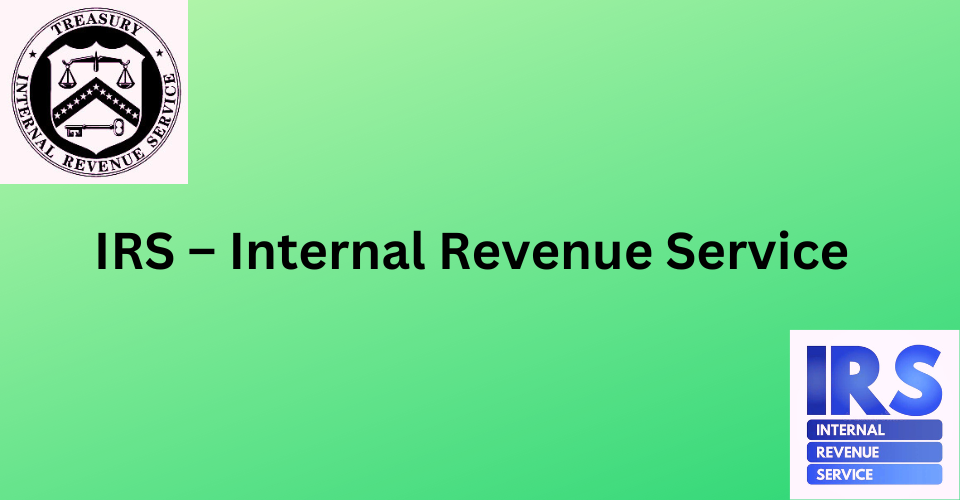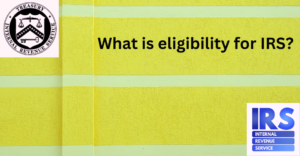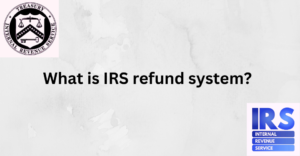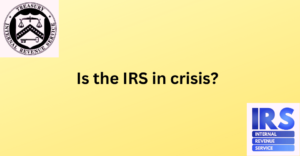
IRS – Internal Revenue Service
What is IRS?
The Internal Revenue Service (IRS) is a bureau of the United States Department of the Treasury that is responsible for the collection of taxes and the enforcement of tax laws. The IRS collects taxes on income, payroll, estates, gifts, and excise. It also oversees the Earned Income Tax Credit (EITC) and the Child Tax Credit (CTC).
The IRS was created in 1862 to help fund the Civil War. It has since become one of the largest and most important government agencies in the United States. The IRS employs over 80,000 people and collects over $4 trillion in taxes each year.
The IRS is responsible for a wide range of tasks, including:
- Collecting taxes from individuals and businesses
- Enforcing tax laws
- Providing taxpayer assistance
- Overseeing certain tax credits and benefits programs
The IRS also plays an important role in combating tax fraud and evasion. The IRS uses a variety of methods to detect and prevent tax fraud, including audits, investigations, and criminal prosecutions.
The IRS is a vital part of the US government, and it plays an important role in ensuring that everyone pays their fair share of taxes.
Here are some of the ways that the IRS helps taxpayers:
- The IRS provides a variety of resources to help taxpayers understand their tax obligations and file their taxes correctly. These resources include online tools, publications, and toll-free assistance lines.
- The IRS offers a number of programs to help taxpayers who are struggling to pay their taxes. These programs include installment payment plans, penalty relief, and bankruptcy assistance.
- The IRS also works to educate taxpayers about their rights and responsibilities. The IRS offers a variety of educational programs and resources, including online tools, publications, and toll-free assistance lines.
Who needs this?
Anyone who needs to file taxes in the United States needs to know about the IRS. This includes individuals, businesses, and other organizations.
Here are some specific examples of people who need to know about the IRS:
- Individuals who earn income from wages, salaries, tips, or self-employment
- Businesses that sell goods or services
- Nonprofits and other organizations that are exempt from paying taxes
- Individuals who receive tax credits or deductions
- Individuals who are owed a refund or who owe taxes
- Individuals who are being audited by the IRS
If you are unsure whether you need to file taxes or if you have any questions about your taxes, you should contact the IRS.
Here are some of the things that the IRS can help you with:
- Understanding your tax obligations
- Filing your taxes correctly
- Getting help with tax credits and deductions
- Getting help with tax payment plans or penalty relief
- Getting help with tax audits
- Understanding your rights and responsibilities as a taxpayer
The IRS provides a variety of services to taxpayers, including:
- Tax help: The IRS provides a variety of resources to help taxpayers understand their tax obligations and file their taxes correctly. These resources include online tools, publications, and toll-free assistance lines.
- Tax payment plans: The IRS offers a number of programs to help taxpayers who are struggling to pay their taxes. These programs include installment payment plans, penalty relief, and bankruptcy assistance.
- Tax audits: The IRS conducts audits to ensure that taxpayers are paying their fair share of taxes. If you are audited, the IRS will work with you to understand your tax situation and resolve any issues.
- Taxpayer rights: The IRS respects the rights of all taxpayers. If you feel that your rights have been violated, you can contact the IRS Taxpayer Advocate Service for assistance.
The IRS is committed to helping taxpayers understand and meet their tax obligations. If you have any questions about your taxes, you should contact the IRS for assistance.
Here are some additional tips for taxpayers:
- File your taxes on time: Filing your taxes on time is the best way to avoid penalties and interest charges.
- Keep good records: Keeping good records will make it easier to file your taxes correctly and avoid audits.
- Pay your taxes in full: If you can’t pay your taxes in full, contact the IRS to discuss your options.
- Be honest and accurate on your tax return: The IRS has a number of tools to detect tax fraud and evasion, so it’s important to be honest and accurate on your tax return.
What is eligibility for IRS?

- You must be a U.S. citizen or resident alien.
- You must be at least 18 years old.
- You must have a valid Social Security number or Individual Taxpayer Identification Number (ITIN).
- You must meet the income requirements for your filing status.
The income requirements for filing taxes vary depending on your filing status. You can find the current income requirements on the IRS website.
If you meet all of the above requirements, you are eligible to file a tax return.
Here are some additional things to keep in mind about eligibility for the IRS:
- If you are a married couple, you can file a joint tax return or separate tax returns.
- If you are a single parent, you may be eligible to claim the head of household filing status.
- If you are a student, you may be eligible to claim the student loan interest deduction.
- If you are a senior citizen, you may be eligible to claim the senior citizen tax credit.
If you have any questions about whether you are eligible to file a tax return, you should contact the IRS for assistance.
- Determining your eligibility for filing taxes
- Choosing the right filing status
- Claiming the correct tax credits and deductions
- Avoiding common tax mistakes
Is it tax-related?
Yes, the Internal Revenue Service (IRS) is tax-related. The IRS is a bureau of the United States Department of the Treasury that is responsible for the collection of taxes and the enforcement of tax laws. The IRS collects taxes on income, payroll, estates, gifts, and excise. It also oversees the Earned Income Tax Credit (EITC) and the Child Tax Credit (CTC).
The IRS is an important part of the US government, and it plays a vital role in ensuring that everyone pays their fair share of taxes. The IRS also helps taxpayers understand their tax obligations and file their taxes correctly.
If you have any questions about your taxes or about the IRS, you can contact the IRS for assistance. The IRS is here to help taxpayers meet their tax obligations and avoid any problems.
So, to answer your question directly, yes, the IRS is tax-related.
What is IRS refund system?

The IRS refund system is the process by which the IRS returns money to taxpayers who have overpaid their taxes. The IRS typically issues refunds within 21 days of receiving electronically filed tax returns, and longer for paper returns.
Taxpayers can check the status of their refund using the IRS’s Where’s My Refund tool. This tool is available online and through the IRS mobile app.
If you have not received your refund within 21 days of electronically filing your tax return, or within 6 weeks of mailing your paper return, you can contact the IRS for assistance.
Here are some of the reasons why your refund may be delayed:
- Your tax return is incomplete or inaccurate.
- Your tax return is being audited.
- You owe other taxes, such as child support or student loans.
- You have claimed a tax credit that is being verified.
If your refund is delayed, you will receive a letter from the IRS explaining the reason for the delay and what steps you need to take to resolve the issue.
Here are some tips for avoiding refund delays:
- File your tax return electronically. Electronic returns are processed faster than paper returns.
- Make sure your tax return is complete and accurate.
- If you are claiming a tax credit, make sure you have all of the required documentation.
- If you owe other taxes, pay them as soon as possible.
If you have any questions about the IRS refund system or about your refund, you can contact the IRS for assistance.
Here are some of the ways to contact the IRS:
- Online: The IRS website has a variety of resources, including the Where’s My Refund tool and the IRS Taxpayer Advocate Service.
- Phone: You can call the IRS at 1-800-829-1040 for assistance.
- In-person: You can visit an IRS Taxpayer Assistance Center for in-person assistance.
How do I track my IRS check?
There are two ways to track your IRS check:
- Online: You can use the IRS’s Where’s My Refund tool to track the status of your refund. This tool is available online and through the IRS mobile app. To use the tool, you will need your Social Security number, filing status, and the exact amount of your refund.
- By phone: You can call the IRS at 1-800-829-1040 to check the status of your refund. However, wait times can be long, so it is generally recommended to use the Where’s My Refund tool instead.
The Where’s My Refund tool is updated once a day, usually overnight. You can check the status of your refund up to 24 hours after electronically filing your tax return, and up to 4 weeks after mailing your paper return.
If you have not received your refund within 21 days of electronically filing your tax return, or within 6 weeks of mailing your paper return, you can contact the IRS for assistance.
Here are some tips for tracking your IRS check:
- Have your Social Security number, filing status, and the exact amount of your refund ready before you check the status of your refund.
- Check the status of your refund regularly, especially if you are expecting to receive a refund soon.
- If you have any questions about the status of your refund, contact the IRS for assistance.
Is the IRS in crisis?

Yes, the IRS is in crisis. It is facing a backlog of millions of unprocessed tax returns, and its workforce has shrunk significantly in recent years. This makes it difficult for the IRS to provide timely and accurate customer service, and it increases the risk of tax fraud.
The IRS is also facing a number of other challenges, such as the increasing complexity of the tax code and the rise of cryptocurrency. These challenges make it difficult for the IRS to keep up with the latest developments and to ensure that all taxpayers are paying their fair share of taxes.
The IRS is taking steps to address these challenges, but it is clear that the agency is in need of additional resources and support.
What number do I call to talk to someone at the IRS?
To talk to someone at the IRS, you can call 1-800-829-1040. This is the main IRS phone number, and it is available Monday through Friday from 7:00 AM to 7:00 PM ET.
Please note that wait times can be long, especially during peak tax season. It is generally recommended to use the IRS’s Where’s My Refund tool or the IRS Taxpayer Advocate Service website before calling the IRS.
Here are some other IRS phone numbers that you may need:
- Taxpayer Advocate Service: 1-877-777-4778
- Forms and publications: 1-800-829-3676
- TTY/TDD: 1-800-829-4059
The IRS also has a number of online resources that you may find helpful, including:
- IRS website: https://www.irs.gov
- Where’s My Refund tool: https://www.irs.gov/refunds
- Taxpayer Advocate Service website: https://www.taxpayeradvocate.irs.gov
Why is IRS refund taking so long?
There are a number of reasons why your IRS refund may be taking so long to process. Here are some of the most common reasons:
- Your tax return is incomplete or inaccurate: If your tax return is missing any required information or contains any errors, the IRS will need to review it more closely, which can delay your refund.
- Your tax return is being audited: If the IRS selects your tax return for an audit, your refund will be delayed until the audit is complete.
- You owe other taxes: If you owe other taxes, such as child support or student loans, the IRS may offset your refund to pay those debts.
- You have claimed a tax credit that is being verified: If you have claimed a tax credit, such as the Earned Income Tax Credit (EITC) or the Child Tax Credit (CTC), the IRS may need to verify the information you provided before they can issue your refund.
- The IRS is experiencing high volume: During peak tax season, the IRS experiences a high volume of tax returns. This can lead to delays in processing refunds.
If you have waited more than 21 days for your refund after electronically filing your tax return, or more than 6 weeks for your refund after mailing your paper return, you can check the status of your refund using the IRS’s Where’s My Refund tool. You can also call the IRS at 1-800-829-1040 to check the status of your refund.
Here are some tips to help avoid refund delays:
- File your tax return electronically. Electronic returns are processed faster than paper returns.
- Make sure your tax return is complete and accurate.
- If you are claiming a tax credit, make sure you have all of the required documentation.
- Pay any other taxes you owe as soon as possible.
Why is the IRS so slow in 2023?
There are a number of reasons why the IRS is so slow in 2023.
- Backlog of unprocessed tax returns: The IRS is facing a backlog of millions of unprocessed tax returns from previous years. This is due to a number of factors, including budget cuts, staff shortages, and the COVID-19 pandemic.
- Complexity of the tax code: The US tax code is complex and ever-changing. This makes it difficult for the IRS to keep up with the latest changes and to process tax returns accurately and efficiently.
- Rise of cryptocurrency: The rise of cryptocurrency has created new challenges for the IRS. Cryptocurrency transactions can be difficult to track and tax, and the IRS is still developing guidance on how to tax cryptocurrency.
- Increased tax fraud: The IRS is also facing an increase in tax fraud. This is due to a number of factors, including the availability of tax return preparation software and the rise of identity theft.
The IRS is taking steps to address these challenges, but it will take time to reduce the backlog of unprocessed tax returns and to improve the overall efficiency of the tax system.
In addition to the above reasons, the following factors may also contribute to the slowness of the IRS in 2023:
- The Inflation Reduction Act of 2022: The Inflation Reduction Act of 2022 includes a number of new tax provisions, such as a corporate minimum tax and an extension of the enhanced child tax credit. These new provisions will require the IRS to develop new systems and procedures, which could lead to delays in processing tax returns.
- The COVID-19 pandemic: The COVID-19 pandemic continues to impact the IRS. The IRS is still operating with a reduced workforce, and it is facing challenges in training new employees.
- Budget cuts: The IRS has faced budget cuts in recent years. This has led to staff shortages and a reduction in resources.
Has anyone beaten the IRS?

It is very difficult to beat the IRS, but it is not impossible. There have been a few cases where taxpayers have successfully challenged the IRS in court, but these are rare. The IRS has a team of experienced lawyers and accountants who are experts in tax law. They also have the resources to investigate and prosecute taxpayers who try to cheat on their taxes.
If you are facing an audit or other tax issue, it is important to seek professional help from a qualified tax professional. They can help you understand your tax rights and options, and they can represent you in dealings with the IRS.
However, it is important to remember that the IRS is a powerful agency, and they are not easy to beat. If you are caught trying to cheat on your taxes, you could face serious penalties, including fines, jail time, or both.
Can I live chat with an IRS agent?
Yes, you can live chat with an IRS agent. The IRS offers a live chat service on its website, IRS.gov. To access the live chat service, click on the “Live Chat” button at the bottom of the page. You will need to create an account and provide some basic information before you can start chatting with an agent.
The IRS live chat service is available Monday through Friday from 7:00 AM to 7:00 PM ET. However, wait times can be long, especially during peak tax season. If you are unable to get through to an agent on live chat, you can call the IRS at 1-800-829-1040 or visit an IRS Taxpayer Assistance Center in person.
Here are some tips for using the IRS live chat service:
- Have your Social Security number, filing status, and the exact amount of your refund ready before you start chatting with an agent.
- Be clear and concise in your questions.
- If you are asked for any personal information, such as your bank account number or credit card number, be sure to verify the identity of the agent before providing them with any information.
How long can IRS hold your refund?
The IRS can legally hold your refund for up to six months, either from the date you filed your return or from the due date of your return (whichever is later). However, they must pay interest on your refund if they hold it for more than 45 days. If you have not received your refund after six months, you can file a claim with the IRS Taxpayer Advocate Service.
Who went to jail for IRS?

Many people have been sentenced to jail for IRS violations, including tax evasion and fraud. Some high-profile examples include:
- Al Capone: The infamous gangster was sentenced to 11 years in prison for tax evasion in 1931.
- Martha Stewart: The domestic diva was sentenced to five months in prison and five months of house arrest for insider trading and obstruction of justice in 2004. Her obstruction of justice charge stemmed from her lying to investigators about her sale of ImClone Systems stock.
- Wesley Snipes: The actor was sentenced to three years in prison for tax evasion in 2008. He failed to file tax returns from 1999 to 2004, and he owed the IRS over $7 million in taxes.
- Todd Chrisley: The reality TV star and his wife, Julie, were sentenced to 12 and seven years in prison, respectively, for tax evasion and bank fraud in 2022.
These are just a few examples of people who have been sent to jail for IRS violations. If you are considering cheating on your taxes, it is important to remember that the risks are high. If you are caught, you could face serious penalties, including jail time.
What to do if you haven’t filed taxes in 10 years?
If you haven’t filed taxes in 10 years, you need to take action as soon as possible. The IRS may have already filed substitute returns on your behalf, which may contain inaccurate information. This could result in you owing more taxes than you actually do.
Here is what you should do:
- Gather your tax information. This includes your W-2 forms, 1099 forms, and other documentation of your income and expenses. If you don’t have all of your tax information, you can contact your employer or other financial institutions for copies.
- File your missing tax returns. You can file your tax returns electronically or by mail. If you are filing multiple years of tax returns, you can file them all together.
- Pay any taxes that you owe. If you cannot pay your taxes in full, you can contact the IRS to discuss payment options.
Here are some additional tips:
- Be honest and accurate on your tax returns. If you make a mistake, you can file an amended return.
- File your tax returns on time. If you cannot file your taxes on time, you can file an extension.
- Keep good records. This will make it easier to file your taxes accurately in the future.
If you need help filing your taxes, you can contact a tax professional. A tax professional can help you gather your tax information, file your tax returns, and pay any taxes that you owe.
The IRS also offers a number of programs to help taxpayers who have not filed taxes in several years. These programs include the Voluntary Disclosure Program (VDP) and the Streamlined Filing Compliance Procedures (SFCP).
VDP is for taxpayers who have not filed taxes in several years and who owe a significant amount of taxes. Taxpayers who participate in VDP may be able to avoid criminal prosecution and reduce their tax liability.
SFCP is for taxpayers who have not filed taxes in three years or less and who owe less than $75,000 in taxes. Taxpayers who participate in SFCP may be able to avoid penalties and reduce their interest charges.
If you are considering participating in VDP or SFCP, you should contact a tax professional for assistance. A tax professional can help you determine if you are eligible for one of these programs and can help you file the necessary paperwork.
How much money do you have to owe the IRS to go to jail?
There is no specific amount of money that you have to owe the IRS to go to jail. However, the IRS can file criminal charges against you if you owe more than $10,000 in taxes and you willfully evaded paying them. This means that you intentionally failed to file your taxes or you filed false tax returns. If you are convicted of tax evasion, you could be sentenced to up to 5 years in prison.
It is important to note that the IRS does not automatically send people to jail for owing taxes. They will typically work with taxpayers to resolve their tax debt before filing criminal charges. However, if you are unable to pay your taxes or if you refuse to work with the IRS, they may decide to pursue criminal prosecution.
How do I catch up on unfiled taxes?

To catch up on unfiled taxes, you will need to file your missing tax returns and pay any taxes that you owe. The IRS also offers a number of programs to help taxpayers who have not filed taxes in several years.
Here are some steps you can take to catch up on unfiled taxes:
- Gather your tax information. This includes your W-2 forms, 1099 forms, and other documentation of your income and expenses. If you don’t have all of your tax information, you can contact your employer or other financial institutions for copies.
- File your missing tax returns. You can file your tax returns electronically or by mail. If you are filing multiple years of tax returns, you can file them all together.
- Pay any taxes that you owe. If you cannot pay your taxes in full, you can contact the IRS to discuss payment options.
The IRS also offers a number of programs to help taxpayers who have not filed taxes in several years. These programs include:
- Voluntary Disclosure Program (VDP): VDP is for taxpayers who have not filed taxes in several years and who owe a significant amount of taxes. Taxpayers who participate in VDP may be able to avoid criminal prosecution and reduce their tax liability.
- Streamlined Filing Compliance Procedures (SFCP): SFCP is for taxpayers who have not filed taxes in three years or less and who owe less than $75,000 in taxes. Taxpayers who participate in SFCP may be able to avoid penalties and reduce their interest charges.
- Fresh Start Program: The Fresh Start Program is for taxpayers who have unfiled tax returns and are unable to pay their tax debt. Taxpayers who participate in the Fresh Start Program may be able to settle their tax debt for less than the full amount.
If you are considering participating in one of these programs, you should contact a tax professional for assistance. A tax professional can help you determine if you are eligible for one of these programs and can help you file the necessary paperwork.
If you need help filing your taxes, you can contact a tax professional or use the IRS Free File program. The IRS Free File program allows taxpayers with an adjusted gross income of $73,000 or less to file their taxes electronically for free.
It is important to note that the IRS may impose penalties on taxpayers who have not filed their taxes on time. However, the IRS may waive these penalties if you have a reasonable cause for not filing your taxes on time.
To learn more about how to catch up on unfiled taxes, you can visit the IRS website or contact the IRS at 1-800-829-1040.
Can the IRS take money from your bank account without notice?
Yes, the IRS can take money from your bank account without notice in some cases. This is known as a bank levy. The IRS can use a bank levy to collect back taxes, interest, and penalties that you owe.
Before the IRS can levy your bank account, they must send you a notice of intent to levy. This notice will give you 30 days to resolve your tax debt before the IRS levies your account. If you do not resolve your tax debt within 30 days, the IRS can levy your bank account.
The IRS can levy your bank account without notice in the following cases:
- If the IRS believes that you are trying to hide your assets or transfer your money to avoid paying your taxes.
- If the IRS believes that you are likely to leave the country without paying your taxes.
- If the IRS is collecting a state tax debt on behalf of a state.
If you have received a notice of intent to levy, you should contact the IRS immediately to discuss your options. You may be able to set up a payment plan or make other arrangements to avoid having your bank account levied.
Here are some tips to avoid having your bank account levied:
- File your taxes on time and pay your taxes in full.
- If you cannot pay your taxes in full, contact the IRS to set up a payment plan.
- Keep your tax records up to date and organized.
- Respond to all IRS correspondence promptly.
Does the IRS watch your bank account?
Yes, the IRS can monitor your bank account if they have a reason to believe that you are evading taxes. They can do this by using a bank levy or a subpoena.
The IRS can monitor your bank account in a few different ways.
- Bank levy: The IRS can use a bank levy to freeze or seize money in your bank account. This is typically done to collect back taxes, interest, and penalties that you owe.
- Subpoena: The IRS can also use a subpoena to order your bank to provide them with information about your account, such as your account balance and transaction history.
- Information-sharing agreements: The IRS has information-sharing agreements with many banks and other financial institutions. These agreements allow the IRS to access information about your account without having to obtain a warrant or subpoena.
The IRS can use the information it obtains from monitoring your bank account to investigate your tax liability and to identify any potential tax evasion schemes.
The IRS typically only monitors bank accounts if they have a reason to believe that a taxpayer is evading taxes. Some of the red flags that may trigger an IRS investigation include:
- Large cash deposits or withdrawals
- Frequent transfers between different bank accounts
- Deposits from offshore accounts
- Unexplained changes in income or lifestyle
If you are concerned about the IRS monitoring your bank account, there are a few things you can do to protect your privacy:
- Use multiple bank accounts for different purposes, such as a checking account for everyday expenses and a savings account for long-term savings.
- Avoid making large cash deposits or withdrawals.
- Be transparent about your income and lifestyle.
- If you are audited by the IRS, cooperate fully and provide them with all of the requested information.
The IRS has a number of tools at its disposal to track down and collect taxes from evaders. One of these tools is bank account monitoring. The IRS can use a variety of methods to monitor bank accounts, including bank levies, subpoenas, and information-sharing agreements.
The IRS typically only monitors bank accounts if they have a reason to believe that a taxpayer is evading taxes. Some of the red flags that may trigger an IRS investigation include large cash deposits or withdrawals, frequent transfers between different bank accounts, deposits from offshore accounts, and unexplained changes in income or lifestyle.
If you are concerned about the IRS monitoring your bank account, there are a few things you can do to protect your privacy. Use multiple bank accounts for different purposes, avoid making large cash deposits or withdrawals, be transparent about your income and lifestyle, and cooperate fully with the IRS if you are audited.
Overall, the IRS is a powerful agency with a wide range of tools at its disposal to collect taxes. Taxpayers who are evading taxes should be aware of the risks involved and should consider taking steps to protect themselves.

